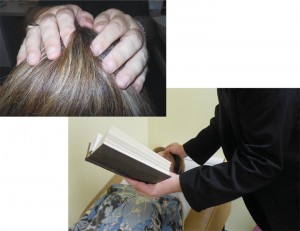Anointing of the Sick
ATTENTION ALL PARISHIONERS! HOSPITAL AND HOSPICE PASTORAL CARE
To ensure pastoral visitation while in the hospital, hospice or homebound, it is necessary to call the Parish Office to advise us 561-392-0007. It is also critical for the hospital & hospice that upon admission you identify yourself as a Catholic and, if you choose, a Catholic requesting a Clergy Pastoral Visit. Boca Raton Regional Hospital does not advise us of your presence in the hospital and your desire for pastoral visitation unless you specifically request upon admission that they do so.
The Healing Power of Christ in the Anointing of the Sick
One of the unique characteristics of Roman Catholicism is our Sacred Tradition of celebrating seven sacraments. They are often grouped into the Sacraments of Initiation (Baptism, Confirmation and Holy Eucharist), Sacraments of Healing (Penance and Anointing of the Sick), and the Sacraments of Commitment (Marriage and Holy Orders). This system of interrelated sacraments evolved over the first centuries of our Church’s history and are all rooted in the life and ministry of Jesus.
In fact, the truth of the sacraments is that they are all the words and actions of Christ expressed in and through the Church, the Body of Christ. Christ is the Celebrant of all of the sacraments and it is His saving presence and activity that makes them holy, transformational and efficacious. The Priest Celebrant acting in the person of Christ allows His presence to be visible and powerful for us. It is important to remember that because the sacraments are the words and actions of Christ expressed in and through the Church, His Body, they are always objectively speaking an occasion of grace (power, presence and life of God). Christ’s offering of Himself as Savior and Lord is always present, always powerful. However, subjectively speaking, our faith, preparation and participation are also critical in determining what difference Christ’s saving words and actions will make in our lives.
The Anointing of the Sick traces its origin to the many times that Our Lord showed compassion, anointed, laid hands upon, prayed for and healed the sick during His Public Ministry. In fact, some of the most compelling encounters that occur in the Gospels involve Jesus healing the physically disabled and those struggling with physical or emotional illnesses. Often, Jesus would drive out demonic forces that bedeviled and kept people captive and suffering. His words of healing and compassion had such power as to transform and set people free not only from the power of sin but also from the power of sickness and disease. His command to His apostles and disciples was to imitate Him in their ministry to the sick and suffering, So our Church has always shown special love and care for the sick. Sacramental healing that may be spiritual, emotional or physical continues to be Christ’s way of continuing His compassionate presence for all times.
In our parish, the Anointing of the Sick has a very important place in pastoral care. Everyday, the priests of our parish visit patients in the hospital, those in hospice care and others who are home bound with the Anointing of the Sick. The Sacrament has several important elements: prayer, imposition of hands on the person’s forehead, anointing of the forehead and the hands, scripture readings and blessings. Sometimes the Anointing of the Sick is also accompanied by Penance and often with the reception of Holy Communion. This powerful combination of the words and actions of Christ strengthens the faith of the sick person and often is an occasion of physical healing as well.
Church practice usually reserves the Anointing fo the Sick to those who have a serious or protracted illness. The sacrament may be received more than once but a reasonable period of time between anointing is recommended. The Anointing of the Sick is such a saving encounter with Christ, that the sacrament itself accomplishes freeing from sin especially for those who are very sick or terminally ill. Because the Anointing of the Sick is best received while the person is alert and conscious so as to be able to actively participate, past practices when the sacrament was delayed until near death are discouraged today. It is an incredibly powerful experience for a sick person to be surrounded by loved ones, prayed for, read scripture, anointed, blessed and given Holy Communion. As is the case with all of the sacraments, the invisible love and power of God made visible in the words and actions of the Anointing of the Sick, make Christ as present and as real as He was in His earthly life. True to His promise, through the sacraments, Christ The Divine Physician, remains with us today and until the end of time.

